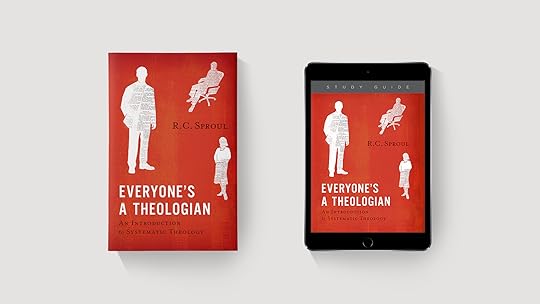R.C. Sproul's Blog, page 35
January 19, 2021
New Study Guide Now Available

Many people react negatively to the word “theology,” believing that it involves dry, fruitless arguments about minute points of doctrine. But since we all have some idea of who God is, each of us is engaged in theology and everyone is a theologian. The question is, will we be sound theologians or unsound theologians?
In his book Everyone’s a Theologian, R.C. Sproul surveys the essential truths of the Christian faith, reminding us of what God is like and of what He has done for His people in this world and the next. Order a copy of your own to better understand what you believe, why you believe it, how to live it, and how to share it.
A new companion study guide for this book is now available for digital download. Order yours today to take your study even further, and we’ll add it to your Learning Library so you can keep it forever.


Unseen Righteousness
Here’s an excerpt from Unseen Righteousness, Victor Cruz's contribution to the December issue of Tabletalk:
Everybody can relate to the words of a little kid playing or doing something in the presence of his parents: “Look, Mommy; look, Daddy!”
We were created to enjoy and find delight in the eyes of our Creator and in the eyes of other human beings. We were designed to be seen, to be known, and to be loved. What a pleasure it is to be celebrated, and what a joy it is to be praised for our achievements. What pride there is in knowing that people around us speak well of us.
Continue reading Unseen Righteousness, or begin receiving Tabletalk magazine by signing up for a free 3-month trial.


January 18, 2021
When Should I Leave a Church?

There are times when leaving a church is permissible, and there are times when our departure is necessary. From one of our Ask R.C. events, R.C. Sproul thinks soberly about the circumstances that warrant our parting from a particular congregation. To get real-time answers to your biblical and theological questions, just ask Ligonier.
Read the Transcript

We Can Have Confidence

Sennacherib ruled Assyria from the capital city of Nineveh, which was the largest city in the world at the time. He was formidable, ruthless, a military ruler bent on collecting nations. Nebuchadnezzar II, the ruler of the Babylonian Empire, surpassed him. He made Babylon even larger and greater than Nineveh. Nothing like it had ever been seen. Cyrus surpassed them both, creating the world’s largest empire through merciless force. When Cyrus’ vast army marched, the ground shook for miles.
Of these great kings and ancient empires, Isaiah 40:15 declares:
Behold, the nations are like a drop from a bucket,
and are accounted as dust on the scales;
behold, he takes up the coastlands like fine dust.
As the city of Rome had fallen, and the Vandals, the Huns, the Goths, and the Visigoths were dismantling the Roman Empire, Augustine began his great work The City of God. On the opening page, he declares how great the City of God is, how great the city’s Founder and King is. He extolls this glorious and eternal city, noting that it towers “above all earthly dignities that totter on this shifting scene.” Yes, even Rome tottered.
Isaiah and Augustine have much in common. Both faced seismic political change and social upheaval. Doomsday predictions swirled around them both. People were packing their bags and lacing up their running shoes. Some were hiding in caves. Nevertheless, both Isaiah and Augustine faced these cataclysmic changes with confidence and courage because they had their eyes fixed upon God. Read Isaiah chapter 40. That great chapter is all about who God is. The same can be said for Augustine’s classic book.
Sennacherib, Nebuchadnezzar II, and Cyrus had all been great. Rome and her emperors had been great. The barbarian armies were a great threat. All, however, were a drop in the bucket. Not one of these great rulers and not one of these empires could compare to God and His kingdom. Only ruins remain where these nations once stood.
Throughout biblical history and throughout church history, God’s people have faced difficult circumstances—giants of enemies. Some have faced literal armies. Today, we get discouraged by all that we see around us. It is easy to despair as evil seems to prosper, and it is easy to become overwhelmed. But, we can learn from those who have gone before us to have a proper perspective. We must look beyond the temporal and finite and look to our eternal God, to His eternal Word, and toward His eternal kingdom. Isaiah, Augustine, and many others teach us not to cower in the face of our circumstances, but to stand tall in confidence in God.
We also learn that confidence in God is not an excuse to disengage or to retreat from our present circumstances. Augustine cared, evidenced in working alongside his longtime friend Bonafacius, Roman general and former governor of Africa, in the resistance to the barbarians as they laid siege to the gates of Hippo Regius. Augustine, however, knew these efforts to be penultimate. The ultimate reality and purpose is the City of God.
Confidence in God is not a reason to have overconfidence in our stratagems or in politics. That, too, is a lesson history teaches us. Instead, confidence in God means boldness to deploy that which God has instituted and to rely upon the means He has given us. God has called us to pray, so we pray for the nations, for our rulers, and for justice and equity. God has given us His Word, so we study and teach it, we trust and obey it, and we defend it. God has given us the family, so we cherish it and nurture it, even as beachheads in enemy territory. God has given us the church, so we commit ourselves to our local churches as they shine like lights in the darkness. God has given us convictional and confessional schools, colleges, seminaries, and ministries, so we pray for them and the advance of the gospel. God has also given us gifts and talents, and so we develop them and serve God and our fellow man in our various vocations and in our communities. God even calls us to be citizens, so we take up our task knowing, like Augustine, what is penultimate and what is ultimate. We know this is God’s world, so we do not abandon it. While we are here, we serve and we testify to God, in whose image we are made. We testify to Christ, who can remake us, who heals the sick, gives sight to the blind, raises the dead, and is making all things new. We serve wholeheartedly on earth, while we long for heaven. We, too, totter on this shifting earth, so we wait and we work until God brings us home.
We can have confidence today because we know that God is surpassingly great and glorious, mighty, eternal, infinite, resplendent in transcendent majesty. We know that God’s Word will not return void. We know that God’s church will not be thwarted. We know that God’s kingdom—and it alone—will have no end. How can we not have confidence?
For a limited time, you can also download the free ebook edition of A Time for Confidence by Stephen Nichols to remember that though the world may shake around us, God’s kingdom is unshakable.


January 16, 2021
Saul, Saul, Why Are You Persecuting Me?
As he was traveling to Damascus, Saul of Tarsus beheld a great light and heard a heavenly voice: “Saul, Saul, why are you persecuting Me?” In this brief clip, R.C. Sproul demonstrates what this intimate address reveals about Jesus’ relationship to His church.
Transcript:
And so, we read in verse three of chapter nine, “As he journeyed, he came near Damascus, and suddenly a light shone around him from heaven. Then he fell to the ground, and heard a voice saying to him, ‘Saul, Saul, why are you persecuting Me?’” Let me take a minute to give some exposition of that particular question that he hears. The first thing is that Paul sees a blinding light that elsewhere is called more brilliant than the noonday sun, and the response that he has is to fall to the ground. Now we know that the light that he beheld was the radiant glory, the Shekinah glory of God Himself, to which the Scriptures attest over and over again as the outward display or manifestation of His inner character. And so, Saul sees this blinding light in the sky and falls to the ground, and he hears—as we are told elsewhere—he hears this voice speaking to him in the Hebrew language. And the voice says to him, “Saul, Saul, why are you persecuting Me?”
Now, there are two things I want to say about that voice that he hears. The first thing is that when Saul is addressed by the heavenly voice, he’s addressed in terms of the repetition of his name: “Saul, Saul.” Search the Scriptures and see how many times in the Bible anybody is addressed for any reason by the repetition of their name. You will discover that it occurs less than twenty times in the whole scope of redemptive history. And if you would examine each of the occurrences that are recorded for us, you would see something emerge very clearly. When Moses was called in the Mideonite wilderness, God called out of the burning bush, “Moses, Moses.” When Abraham was at Mount Mariah and was just about to stab his son on the altar, the voice of God came to him, saying, “Abraham, Abraha.” When Elisha stood on the earth and watched the ascent of Elijah, he said, “My father, my father, the chariots of Israel!” When David mourned the loss of his son, he cried “Absalom, Absalom, my son, my son!” Jesus on the cross, “Eli, Eli, lema sabacthani.” Over and over and over again we see this, and it’s always an expression, in the Hebrew tongue, of profound personal intimacy. That’s why Jesus at the end of the Sermon on the Mount said that many people on the last day would come and say, “Lord, Lord”—that is, their hypocrisy would be clothed in this hypocritical form of the repeated address, claiming intimacy with Jesus. Not just a passing knowledge of Him—they’ll say, “Lord, Lord!” Jesus will say, “Depart from Me; I never knew you.” And so, what this voice is saying to Saul is, “Saul, I know you; I know everything about you. I know you intimately, and I love you. But why are you persecuting Me?”
Now notice the question isn’t “Why are you persecuting My church.” it’s “Why are you persecuting Me?” Because the church is the body of Christ. It is the bride of Christ. And anyone who attacks His bride is attacking Him. Anyone who assaults His body is assailing Him. And even in these words, we learn much of Jesus’ view of His relationship to His body, the church. Because Saul had not been personally attacking Jesus—He had never met Jesus before. But He was laying waste the body of Christ. And so now the voice says to him, “Why are you persecuting Me?” And he said, “Who are You, Lord?”
I don’t know which form of the concept “Lord,” he was using. This may simply be the polite form of address saying, “Who are you, sir?” But given the circumstances of the blinding radiance of the refulgent glory of God, I suspect that Paul, or Saul at this point, knew instantly that whoever it was who was speaking to him was his sovereign Lord.


January 15, 2021
What Does It Mean to Be “in Christ”?

When we are “in Christ,” we are brought into union with Him and all the riches of His grace. From one of our live events, Steven Lawson and Derek Thomas examine this phrase that identifies what it means to be a Christian. Ask your biblical and theological questions live online at ask.Ligonier.org.
Read the Transcript


How Do We Know the Bible Is True?

That's an excellent question because so much is at stake in the Christian faith in terms of the truthfulness of Scripture. The Bible is our primary source of information about Jesus and about all of those things we embrace as elements of our faith. Of course, if the Bible isn't true, then professing Christians are in serious trouble. I believe the Bible is true. I believe it is the Word of God. As Jesus Himself declared of the Scripture, "Your word is truth." But why am I persuaded that the Bible is the truth?
We need to ask a broader question first. How do we know that anything is true? We're asking a technical question in epistemology. How do we test claims of truth? There is a certain kind of truth that we test through observation, experimentation, eyewitness, examination, and scientific evidence. As far as the history of Jesus is concerned, as far as we know any history, we want to check the stories of Scripture using those means by which historical evidence can be tested—through archaeology, for example. There are certain elements of the Scripture, such as historical claims, that are to be measured by the common standards of historiography. I invite people to do that—to check it out.
Second, we want to test the claims of truth through the test of rationality. Is it logically consistent, or does it speak with a "forked tongue"? We examine the content of Scripture to see if it is coherent. That's another test of truth. One of the most astonishing things, of course, is that the Bible has literally thousands of testable historical prophecies, cases in which events were clearly foretold, and both the foretelling and the fulfillment are a matter of historical record. The very dimension of the sheer fulfillment of prophecy of the Old Testament Scriptures should be enough to convince anyone that we are dealing with a supernatural piece of literature.
Of course, some theologians have said that with all of the evidence there is that Scripture is true, we can truly embrace it only with the Holy Spirit working in us to overcome our biases and prejudices against Scripture, against God. In theology, this is called the internal testimony of the Holy Spirit. I want to stress at this point that when the Holy Spirit helps me to see the truth of Scripture and to embrace the truth of Scripture, it's not because the Holy Spirit is giving me some special insight that he doesn't give to somebody else or is giving me special information that nobody else can have. All the Holy Spirit does is change my heart, change my disposition toward the evidence that is already there. I think that God Himself has planted within the Scriptures an internal consistency that bears witness that this is His Word.
This excerpt is adapted from Now, That’s a Good Question! by R.C. Sproul.


January 14, 2021
$5 Friday (And More): Scripture, Predestination, & Atonement

It’s time for our weekly $5 Friday sale. This week’s digital resources include such topics as scripture, predestination, atonement, Martin Luther, and more.
Plus, several bonus resources are also available for more than $5. These have been significantly discounted from their original price. This week’s bonus resources include:
The Legacy of Luther , Audiobook Download $15.20 $10 The Atonement of Jesus with R.C. Sproul, Audio Download $20 $10 The Beatitudes with R.C. Sproul, Audio Download $16 $10 Predestination with R.C. Sproul, Audio Download $16 $10 Holy Scripture with R.C. Sproul, Audio Download $19.20 $10And MoreSale runs through 12:01 a.m.–11:59 p.m. Friday ET.
View today’s $5 Friday sale items.


Confident in the Word of God: January 14, 2021

In December, our president and CEO, Chris Larson, hosted a panel discussion with three of Ligonier’s Teaching Fellows: Drs. Sinclair Ferguson, Steven Lawson, and Stephen Nichols. On January 14, we streamed this discussion on the power of God’s Word and Spirit to strengthen His church in challenging times and to awaken people around the world to His holiness.
This special event was streamed on Ligonier’s blog, YouTube, Facebook, and Twitter. You can also watch a recording of the discussion above.
Watch Now

Honoring the Watchmen on the Wall
Here’s an excerpt from Honoring the Watchmen on the Wall, John P. Sartelle Sr.'s contribution to the January issue of Tabletalk:
I was enjoying the book when the author asked a question that has dwelled in my soul for the last thirty years: “Are you turning your theology into your biography?” Now, the proper way of asking the question more correctly is “Are you turning biblical theology into your biography?” I suppose everyone is turning whatever they happen to believe into their biography. We usually do that automatically. But as followers of Jesus the Christ, we are called to turn the theology of God’s Word into the way that we live. That is more difficult than merely living out whatever we choose to believe. It is far more convenient to conform to the gods we have made in our own image than to conform to the Son of God. I was born with a nature that seeks escape from the binding cords of God’s being and Word.
Continue reading Honoring the Watchmen on the Wall, or begin receiving Tabletalk magazine by signing up for a free 3-month trial.
For a limited time, the new TabletalkMagazine.com allows everyone to browse and read the growing library of back issues, including this month’s issue.


R.C. Sproul's Blog
- R.C. Sproul's profile
- 1931 followers



